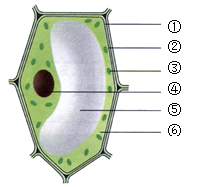下图是某植物细胞,请据图作答:(10分)

(1)图中⑤是 ,⑥是
(2)图中②是 ,其主要作用是
(3)对生物的传种接代起重要作用的遗传物质存在于【 】 内。
(4)在细胞分裂中,变化最明显的是【 】___ ,细胞分裂前后遗传物质的变化是_________(填变多或不变)
(5)与人的口腔上皮细胞相比,主要不同是【 】 【 】 和细胞壁。
(6)细菌与该细胞相比主要的区别是
(1)液泡 细胞质
(2)细胞膜 控制物质的进出
(3)4细胞核 (4)4细胞核 不变
(5)3叶绿体 5液泡 (6)无成形的细胞核
题目分析:(1)图示中①是细胞壁,②是细胞膜,③是叶绿体,④是细胞核,⑤是液泡,⑥是细胞质;
(2)细胞膜紧贴在细胞壁的内面,能控制物质进出,保持细胞内部环境的相对稳定;
(3)细胞核一般位于细胞的中央,里面有遗传物质,能够传递遗传信息,对细胞的生命活动起控制作用;
(4)在细胞分裂过程中,染色体复制加倍,随着分裂的进行,染色体分成形态和数目相同的两份,分别进入两个新细胞中.这样就保证了通过细胞分裂产生的新细胞与原细胞所含的遗传物质相同;
(5)动物细胞和植物细胞相比,它们都有细胞膜、细胞核、细胞质、线粒体,但是动物细胞没有细胞壁、叶绿体和液泡,而植物细胞有细胞壁、叶绿体和液泡.因此植物细胞与动物细胞区别在于植物细胞有:细胞壁、叶绿体和液泡;
(6)细菌的基本结构有细胞壁、细胞膜、细胞质和DNA集中的区域,没有成形的细胞核.没有叶绿体,因此营养方式是异养,必须依靠现成的有机物维持生活,在生态系统中扮演分解者.而动植物细胞的基本结构是细胞膜、细胞质和细胞核.植物细胞有叶绿体,在生态系统中扮演生产者;动物细胞没有叶绿体,扮演消费者.因此细菌与动植物细胞的主要区别是细胞内没有成形的细胞核.
